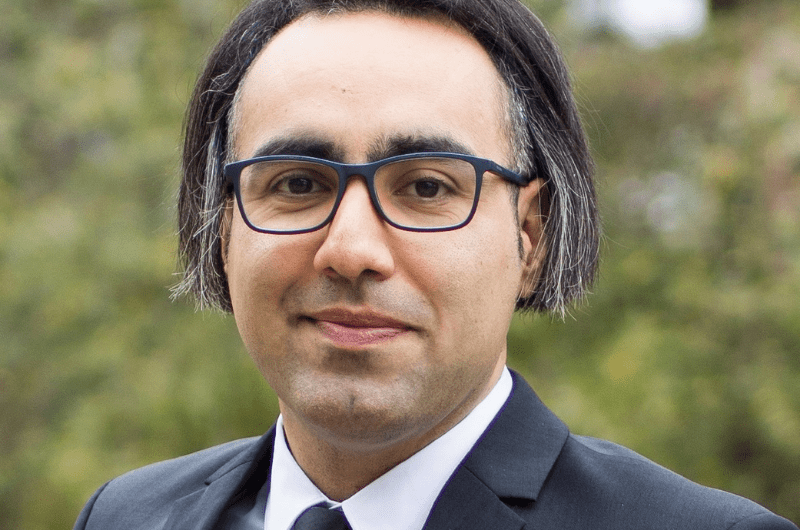
Staff Profile: Prof. Dr. Mohammad Mahdavi
With the goal of educating students to become business leaders, GISMA Business School has been selective in getting the best faculty on board. All our educators share similar core values of passion, dedication, and diligence that contribute to the growth of students. The latest professor to join us is Dr. Mohammad Mahdavi.
Introduction of Prof. Dr. Mohammad Mahdavi
Prof. Dr. Mohammad Mahdavi is a Professor for Data Science who has recently became a part of GISMA Business School’s faculty, on 1 February, 2021. He brings with him a lustrous background with years of educational training and research work.
Mohammad Mahdavi received his PhD from TU Berlin. Here, he researched semi-supervised data cleaning approaches and also published a couple of research papers. Two of his most notable papers are on data cleaning systems, namely Raha and Baran. Mohammad Mahdavi has also been awarded the ACM SIGMOD most reproducible paper award. He also worked as a data scientist at HomaPlus before coming to TU Berlin. He earned his MSc degree in artificial intelligence from the University of Tehran and his BSc degree in Computer Engineering from the Iran University of Science and Technology.

Areas of expertise
Mohammad Mahdavi has largely been focused on research work that revolves around designing effective and efficient machine learning-based approaches for huge and heterogeneous datasets. His work often focuses on a few essential topics, highlighted below.
Data Integration and Cleaning
Data cleaning is an essential part of preparing data and is done by removing or modifying data that is incorrect, duplicate, or not properly formatted.
While data is readily available in bulk nowadays, it is too heterogeneous. In a high-level view, data can have different formats like text, image, audio, and video. Talking singularly about textual data, the datasets are still heterogeneously different as they can have a different structure, such as tabular spreadsheets and nested XML files, or no structure at all, as seen in the case of free texts on websites and online social networks.
The problem arises when it comes to processing such heterogeneous datasets in data science pipelines. Such dataset cannot be directly used for data analysis algorithms or can also provide incorrect knowledge and insights. Thus, data scientists have to put in extra efforts to integrate different data sources, standardize data formats, and clean the missing or wrong values.
This time-consuming task takes up almost 80% of the data scientist’s time. This is where Mohammad Mahdavi’s research comes into the picture as its goal is to design savvier data pre-processing approaches. This way heterogeneous datasets can easily be integrated and cleaned in a (near) automatic way.
Data Mining and Applied Machine Learning
Data mining is a popular process that is used by companies to convert raw data into useful information. Even though data is accessible, it cannot be used in its raw form as all the useful knowledge and insights are hidden. Through data mining, interesting patterns from large datasets are extracted using machine learning and data visualization techniques.
It is the application domain that decides the outcome and goal of data mining. A good example of this is the current Coronavirus crisis where one can apply several data mining approaches on Berlin’s daily Corona-related datasets to gain a lot of insights from the raw data: How does the rate of new cases/death change in near future? What factors (such as residents’ district or holidays) contribute to this rate? What impact did the different lockdown policies have on this rate? And so on.
Data mining techniques are also applied to online social networks which are a great data source. Since people comfortably and openly express their opinions on platforms like Facebook and Twitter, it is easier and also beneficial for decision-makers to monitor public opinion on social networks. For example, they might need sentiment analysis systems to continuously monitor people’s opinions about the latest lockdown policies or other political decisions.
Natural Language Processing (NLP) and Information Retrieval
Natural Language Processing or NLP is a field of Artificial Intelligence that focuses on the interaction between data science and human language. Through NLP, machines gain the ability to read, understand and coherently form meaning from human languages. Natural-language textual data is one the most important data formats for humans.
Another important research that Mohammad Mahdavi is focused on is designing machine learning-based approaches that allow computers to process, understand, and generate human-readable texts. A few good examples of NLP applications are text summarisation, grammatical error correction, machine translation, and question answering.
Motto
Given his expertise and background, Mohammad Mahdavi has a lot to offer to GISMA and the students here. His motto is to shape a new tribe of data scientists who think simple, design minimal, and implement accurately.
He believes that the old-fashioned way of going by instincts is passed. The modern age is data-driven and the correct use of data can offer excellent insights to take the best path forward. Knowledge extracted from data eases the decision-making process and is valuable for all future leaders and decision-makers.
Through his learnings and research work, Mohammad Mahdavi not only wants to change the world of data but also equip his students with the knowledge and skills required to succeed in this field.

Keen to make it big in the world of business? Then the wide range of programmes at GISMA Business School can help you begin your professional journey.
You can choose from a wide range of postgraduate degrees, undergraduate degrees, short courses and online courses that are designed to suit the modern day requirements of the work-force. The programmes offered by GISMA are accredited and useful in establishing a global career.
The business school has multiple partnerships including the triple-accredited Grenoble Ecole de Management, The University of Law and Kingston University. If you are interested in beginning your journey with GISMA, then click here!